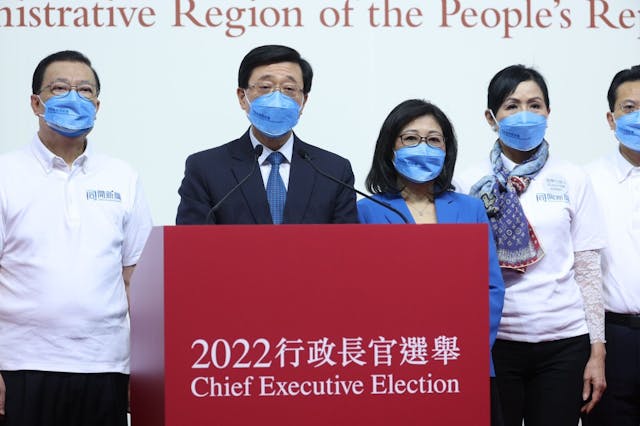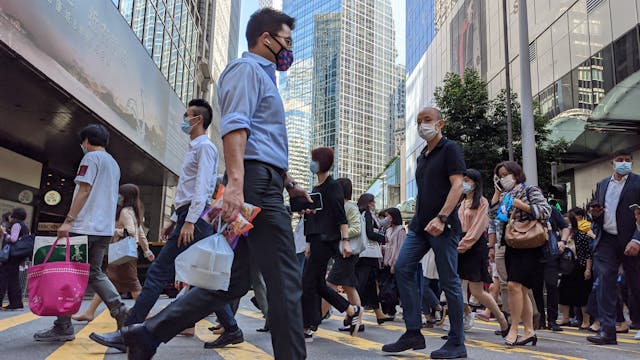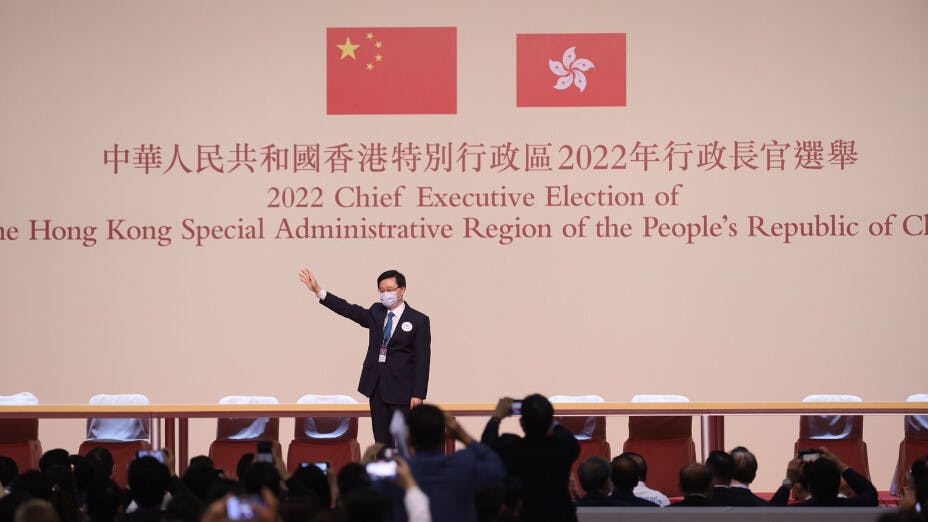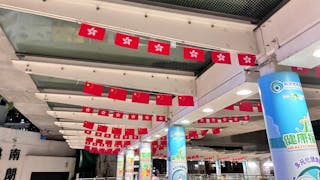在2022年5月8日舉行的第六屆行政長官選舉中,李家超獲得了1428票(投票率97.74%)中的1416票(99.16%),當選新一任行政長官,代表了香港特別行政區政治史上的分水嶺。
「完善選舉制度」3步走完成
首先,2022年是香港特別行政區實行一國兩制第25個年頭,一國兩制前25年的政治發展,在北京中央政府看來,是相對動盪和高度不穩定的。因此,北京在2021年3月改變了第七屆立法會的組成和選舉方式,從而在2021年12月19日舉行了新一屆立法會選舉。立法會的選舉結果,實現了「愛國者治港」的原則,同時排除了所有被視為「反中亂港」的人參與選舉。
第六屆香港特別行政區行政長官選舉是繼9月產生選舉委員會1500名成員和2021年12月的立法會選舉後,「完善選舉制度」3個階段進程的最後一步。因此,5月8日的行政長官選舉,完成了一國兩制50年後半段「完善」香港選舉制度、穩定政治、奠定政治發展基礎的3個階段。
其次,批評者貶低5月8日的行政長官選舉為「政治上無關重要」,因為李家超是唯一候選人。其實不然,這次選舉在中國大陸選舉傳統的「民主集中制」背景下具有政治意義。香港的行政長官選舉仍然是民主的,因為唯一候選人李家超不僅要通過更全面的競選平台,接觸選舉委員會的1500名成員,而且還要接觸到香港社會上的普通市民,營造民主氛圍。
他的選舉合法性必須通過獲得大比數的選票來獲得,並且在程序上通過系統策劃的過程來公布他的政綱,與選民交流,並與一些市民互動。香港行政長官選舉的「集中制」顯而易見;獲得中央默許支持的候選人只有李家超。
第三,李家超獲得中央默許支持,對這次選舉意義重大。據報道,中聯辦官員在4月告訴部分選舉委員會成員,李家超將是這次特首選舉的唯一候選人。意思很明顯:在香港社會和傳媒不斷有傳聞指行政長官選舉將有不止一名候選人參選時,中央在適當時候發出了果斷的政治信號,暗示香港的政治精英應該保持團結,不要搞派系鬥爭,政治團結是香港一國兩制下半場開局的關鍵。
第四,5月8日的行政長官選舉代表了香港式民主的實現。2021年12月20日,就在立法會選舉舉行一天後,中央政府發布了《一國兩制下的香港民主發展》白皮書。白皮書強調,「中國共產黨和中國政府是香港特別行政區民主制度的設計者、創立者、維護者和推進者」。
中國共產黨和中國政府「不僅創造性地提出了一國兩制偉大構想,構建了一國兩制制度體系,而且創造性地建立了符合一國兩制方針和香港實際情況的民主制度」。換言之,香港人必須欣賞和尊重中國共產黨和內地政府在領導和創建一國兩制、塑造符合香港特別行政區需要的政治制度方面的作用。

鞏固國家安全邁出重要一步
因此,北京默許李家超為第六屆特首選舉的唯一候選人,意義重大,他象徵中央政府的有力支持。他曾於2003年至2011年擔任警務處助理處長和副處長,並於2012年至2021年年中任保安局副局長,後任保安局局長,這表明中央領導層更喜歡有強大安全資歷的香港行政長官,來維護北京對香港特別行政區的國家安全,特別是在經歷了動盪多年的社會政治運動之後,包括2012年的反國民教育運動、2014年9月至2014年12月的佔中運動、2016年初的旺角騷亂、10月的立法會議員宣誓事件──2016年11月,2019年下半年「反修例」事件。
2021年3月,特首林鄭月娥對北京表示,2022年7月1日不再擔任下一任特首後,中央決定任命李家超在2021年6月25日出任政務司司長。當時,香港傳媒認為,李家超的任命只是中央在鞏固香港特別行政區國家安全工作方面邁出的一步。然而,大多數觀察家和時事評論員都低估了李家超的背景和資歷,符合中央領導層對香港維護國家安全的政治意願。
團結起來支持李家超是重要任務
第五,中央選舉李家超為下一任香港特別行政區行政長官,符合習近平主席在其重要講話中提出的「落實中央對香港、澳門特別行政區的全面管治權」的重要原則。 2021年7月1日,在中國共產黨成立100周年之際發表講話。
習主席表示,「全面管治權」意味着香港和澳門要「落實特區維護國家安全法律制度和執行機制,維護國家主權安全發展利益,維護特區社會大局穩定,保持香港和澳門長期繁榮穩定」。儘管李家超的競選政綱更多關注2019年政局動盪的社會經濟根源,並輕描淡寫地涉及國家安全問題,但他獲中央支持和5月8日的成功當選,符合中央領導層對香港特別行政區的藍圖。
第六,雖然傳媒拿李家超與其前任在香港行政長官選舉中所獲得的選票作比較,但這種比較忽略了北京對香港特區的首要關切,即政治團結和支持李家超,是香港未來25年一國兩制重要開端不容置疑的任務。
1996年,董建華在400名選舉委員會委員中獲得320票,獲得總票數80%當選第一任行政長官;2007年,曾蔭權在選舉委員會的788張選票中獲得649張,以82.4%的總票數當選為行政長官;2012年,梁振英在選舉委員會的1132張選票中獲得689票,以60.9%的總票數當選為行政長官;2017年,林鄭月娥在1163名選舉委員會委員中獲得777票,以66.8%的總票數當選行政長官。
2021年4月13日,李家超獲得786個提名參加行政長官選舉──這一數字超過了他獲勝所需的751票。5月8日,李家超只有8票反對,輕鬆拿下1416票,顯示多數權力精英明白北京的意圖,賦予他治理香港的強大權力。

穩定香港後台灣問題勢成重點
99%的選票支持李家超,符合中央領導層賦予李家超最大權力的願望,讓他能夠更有效地落實他的政綱,以更有效的方式解決香港特別行政區的社會經濟問題和矛盾。如果香港的社會和政治形勢穩定,經濟逐漸恢復正常,並隨着新冠病毒逐漸消退而出現經濟反彈。那麼,北京的下一個聚焦的政治問題,將是台灣經濟和政治的未來。
正如習近平主席在2021年7月1日的重要講話中強調的那樣,「解決台灣問題、實現祖國完全統一,是中國共產黨矢志不渝的歷史任務,是全體中華兒女的共同願望」。政局穩定、社會進步、經濟繁榮,將是李家超和他的新一屆司長、副司長的重要使命,在可見的未來,中央領導層將轉向處理台灣問題。已故中國領導人鄧小平決心以港澳一國兩制模式,作為未來中共領導人解決台灣政治前途問題的踏腳石。
綜上所述,李家超當選下一任香港特別行政區行政長官,無疑是香港政治發展的一個轉捩點。鑑於香港特別行政區在一國兩制道路上走到一半之際出現的動盪日子,中央決心打造一個政治統一、社會穩定、國家安全和主權得到充分保障的香港。因此,李家超被提名為第六任行政長官的唯一候選人,他將在未來25年一國兩制的開始領導香港,具有重要的政治意義。
李家超和他的新政府將肩負解決香港特區社會經濟矛盾和問題,同時維護北京的國家安全利益的任務。一旦香港特別行政區政局穩定、社會穩定、經濟發展回升,台灣的前途問題將成為中國中央領導層的政策重點。2022年7月1日,中央領導人是否會赴港出席下一任行政長官李家超的就職典禮,將是一國兩制下半場在香港啟動的重要開端。
Halfway to 2047: The Political Significance of Hong Kong’s Chief Executive Election
The election of John Lee as the Chief Executive-designate, who obtained 1,416 (99.15 percent) of the total 1,428 votes (with a 97.74 percent of voter turnout), during the sixth term of the Chief Executive election on May 8, 2022, represented a watershed in the political history of the Hong Kong Special Administrative Region (HKSAR).
First, the year 2022 is marking the 25thyear of the operation of “one country, two systems” in the HKSAR, where its political development during its first 25 years was viewed by the central government in Beijing as relatively turbulent and highly unstable. As such, Beijing changed the composition and the electoral methods of the seventh Legislative Council (LegCo) in March 2021, leading to the holding of the new LegCo elections on December 19, 2021. The LegCo election results realized the principle of “patriots ruling the HKSAR”while excluding the participation of all those people who were deemed as “anti-China and creating chaos to Hong Kong.” The sixth term of the HKSAR Chief Executive election was the last step in the three-stage process of “improving” and “perfecting” the electoral system, following (1) the selection of the 1,500 members of the Election Committee (EC) on September 19, 2021, and (2) the December 2021 LegCo elections. Hence, the Chief Executive election on May 8 was a completion of the three stages of “improving” Hong Kong’s electoral system, stabilizing the polity and establishing the foundation of political development in the second half of the 50 years of “one country, two systems.”
Second, unlike critics who played down the Chief Executive election on May 8 as “politically insignificant” because John Lee was the only candidate, the election was politically significant in the context of “democratic centralism” in the mainland Chinese electoral tradition. The Hong Kong Chief Executive election remains democratic in the sense that (1) the sole candidate, John Lee, had to reach out to not only 1,500 members of the Election Committee by using a more comprehensive campaign platform, but also to ordinary people in the society to foster an atmosphere of democracy. His electoral legitimacy must be earned substantially from gaining a high percentage of votes and procedurally from a systematically orchestrated process of unveiling his platform, communicating with the voters, and interacting with some members of the public. The “centralist” aspect of the Hong Kong Chief Executive election is obvious; there was only one candidate, namely John Lee, who acquired the tacit support of central authorities.
Third, Lee’s tacit support from central authorities was highly significant in this election. It was reported that officials of the Liaison Office in April told some members of the Election Committee that Lee would be the sole candidate in this Chief Executive election. The implication was obvious: while the society and media of the HKSAR kept circulating rumors that there would be more than one candidate running for the Chief Executive elections, the central authorities gave a decisive political signal at a suitable moment, implying that Hong Kong’s political elites should remain united, that they should not fight among themselves through factionalism, and that political unity would be crucial to the beginning of the second half of the “one country, two systems” in the HKSAR.
Fourth, the Chief Executive election on May 8 represented the realization of a Hong Kong style of democracy. On December 20, 2021, just one day after the holding of the LegCo elections, the central government published a document on Hong Kong’s democratic development. The document emphasized that the Communist Party of China (CPC) and the Chinese government were and are the “designer, creator, protector and promoter” of the democratic system of the HKSAR. They not only “innovatively create the great idea of ‘one country, two systems’ but also construct a democratic system in accordance with the principles of ‘one country, two systems’ and suitable for the circumstances of Hong Kong.” In other words, the people of Hong Kong must appreciate and respect the role of the CPC and the mainland government in leading the creation of “one country, two systems” and shaping a political system in accordance with the needs of the HKSAR.
Therefore, Beijing’s tacit endorsement of John Lee as the sole candidate for the sixth term of the Chief Executive election was significant; he symbolized the strong back-up from the central government. His background as a former assistant and deputy commissioner of the police from 2003 to 2011, and as a former undersecretary and then secretary for security from 2012 to mid-2021 demonstrated that the central leadership prefers a Hong Kong Chief Executive with strong security credentials to safeguard Beijing’s national security over the HKSAR, especially after the turbulent years of socio-political movement, including the 2012 anti-national education movement, the September-December 2014 Occupy Central Movement, the Mongkok riot in early 2016, the oath-taking incident in October-November 2016, and the anti-extradition chaos in the latter half of 2019. After Chief Executive Carrie Lam told Beijing in March 2021 that she would not continue to be the next Chief Executive on July 1, 2022, the central leadership decided to appoint John Lee on June 25, 2021, as the Chief Secretary for Administration. At that moment, the Hong Kong media saw Lee’s appointment as merely a step made by the central authorities in consolidating the national security work in the HKSAR. However, most observers and media commentators underestimated that Lee’s background and credentials fit into the central leadership’s political will to safeguard the national security of the People’s Republic of China (PRC) over the HKSAR.
Fifth, the central leadership’s selection of John Lee as the next Chief Executive of the HKSAR conforms to the key principle of “implementing the center’s comprehensive jurisdiction over Hong Kong and Macau special administrative regions,” a key tenet mentioned by President Xi Jinping in his important speech delivered on July 1, 2021, during the one hundred anniversaries of the CPC. According to President Xi, such “comprehensive jurisdiction” meant that Hong Kong and Macau would have “to implement the legal system and executive mechanisms of protecting national security, to protect the national sovereignty, security and developmental interest of the nation, and to protect the long-term prosperity and stability” of the two cities. While John Lee’s campaign platform focused more on the socio-economic roots of the 2019 political disturbances and touched lightly on the national security issue, his endorsement by the center and successful election on May 8 matched the central leadership’s blueprint over the HKSAR.
Sixth, while the media focused on the comparisons and contrasts between John Lee’s votes obtained with his predecessors in the HKSAR Chief Executive elections, such comparisons and contrasts missed the overriding concerns of Beijing over the HKSAR, namely political unity and unquestionable mandate of supporting Lee in the crucial inception of the next 25 years of “one country, two systems” in Hong Kong. In 1996, Tung Chee-hwa gained 320 votes out of the 400 members of the Election Committee, obtaining 80 percent of the total votes and was elected as the first Chief Executive. In 2007, Donald Tsang grasped 649 out of 788 votes from the Election Committee and was elected as the Chief Executive with 82.4 percent of the total votes. In 2012, C. Y. Leung captured 689 out of 1,132 votes from the Election Committee and was elected as the Chief Executive with 60.9 percent of the total votes. In 2017, Carrie Lam got 777 votes out of 1,163 members from the Election Committee and was elected as the Chief Executive with 66.8 precent of the total votes. On April 13, 2021, John Lee acquired 786 nominations to participate in the Chief Executive election – a number exceeding the required 751 votes for his victory. On May 8, Lee easily captured 1,416 votes with only 8 votes against him, demonstrating that the majority of the power elites understood the intention of Beijing and giving him a strong mandate to govern the HKSAR.
The 99 percent votes for Lee fit into the central leadership’s desires to confer strongest mandate upon Lee so that he will implement his platform to address the socio-economic problems and contradictions of the HKSAR in a far more effective manner. If the HKSAR situation is socially and politically stabilized, and if its economy would gradually return to normalcy and would rebound as Covid-19 is gradually fading away, the next political target of the PRC will be the question of Taiwan’s economic and political future. As President Xi Jinping stressed in his important speech on July 1, 2021, “solving the Taiwan question and realizing the motherland’s complete reunification are the historical mission and persistent will of the CPC and the common expectation of all the sons and daughters of China.” Political stability, social progress and economic prosperity will be the crucial mission of John Lee and his new batch of secretaries and undersecretaries so that the central leadership will turn to deal with the question of Taiwan in the foreseeable future. The late Chinese leader Deng Xiaoping was determined to utilize the model of “one country, two systems” in Hong Kong and Macau as a stepping-stone for the CPC’s future leaders to resolve the question of Taiwan’s political future.
In conclusion, John Lee’s election as the next Chief Executive of the HKSAR is undoubtedly a turning point in the political development of Hong Kong. Given the politically turbulent years in the HKSAR during its first half of the path of “one country, two systems,” the central authorities have been determined to create a politically united and socially stable Hong Kong where the center’s national security and sovereignty are fully protected. As such, John Lee’s selection as the sole candidate for the sixth term of the Chief Executive, who will lead Hong Kong at the beginning of the next 25 years of its “one country, two systems,” is politically significant. Lee and his new government will be entrusted with the tasks of solving the socio-economic contradictions and problems of the HKSAR while safeguarding Beijing’s national security interests. Once the HKSAR situation is politically and socially stabilized, and once its economic development witnesses a rebound, the question of Taiwan’s future will become a policy priority of the central leadership in the PRC. It will be interesting to observe whether the central leaders will visit the HKSAR to attend the inauguration ceremony of John Lee as the next Chief Executive on July 1, 2022, which will significantly open the inception of the second half of “one country, two systems” in Hong Kong.
原刊於澳門新聞通訊社(MNA)網站,本社獲作者授權轉載。





































